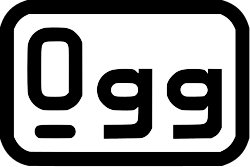
Back أوغ Arabic Ogg AST Ogg Catalan Ogg Czech Ogg Danish Ogg German Ogg Esperanto Ogg Spanish OGG Persian Ogg Finnish
| Filename extension |
.ogg, .ogv, .oga, .ogx, .ogm, .spx |
|---|---|
| Internet media type |
video/ogg, audio/ogg, application/ogg |
| Magic number | OggS |
| Developed by | Xiph.Org Foundation |
| Initial release | May 2003 |
| Type of format | Container format |
| Container for | Vorbis, Theora, Speex, Opus, FLAC, Dirac, and others. |
| Open format? | Yes |
| Free format? | Yes[1] |
 | |
| Developer(s) | Xiph.Org Foundation |
|---|---|
| Initial release | 22 September 2004 |
| Stable release | 1.3.5
/ 4 June 2021 |
| Type | Reference implementation (multiplexer/demultiplexer) |
| License | BSD-style license[2] |
| Website | downloads |
Ogg is a digital multimedia container format designed to provide for efficient streaming and manipulation of digital multimedia. It is maintained by the Xiph.Org Foundation and is free and open, unrestricted by software patents.[3] Its name is derived from "ogging", jargon from the computer game Netrek.[4]
The Ogg container format can multiplex a number of independent streams for audio, video, text (such as subtitles), and metadata. In the Ogg multimedia framework, Theora provides a lossy video layer. The audio layer is most commonly provided by the music-oriented Vorbis format or its successor Opus. Lossless audio compression formats include FLAC, and OggPCM.
Until 2007, the .ogg filename extension was used for all files whose content used the Ogg container format. Since then, the Xiph.Org Foundation recommends that .ogg only be used for Ogg Vorbis audio files. Xiph.Org decided to create a new set of file extensions and media types to describe different types of content such as .oga for audio only files, .ogv for video with or without sound (including Theora), and .ogx for multiplexed Ogg.[5]
Ogg's various codecs have been incorporated into a number of different free and proprietary media players, both commercial and non-commercial, as well as portable media players and GPS receivers from different manufacturers.
As of November 7, 2017, the current version of the Xiph.Org Foundation's reference implementation is libogg 1.3.3.[6] Another version, libogg2, has been in development, but is awaiting a rewrite as of 2018.[7] Both software libraries are free software, released under the New BSD License. Ogg reference implementation was separated from Vorbis on September 2, 2000.[8]
- ^ Ogg File Format (Full draft). Sustainability of Digital Formats. Washington, D.C.: Library of Congress. 19 February 2008. Archived from the original on 8 October 2021. Retrieved 1 December 2021.
- ^ "Sample Xiph.Org Variant of the BSD License". Xiph.Org Foundation. Archived from the original on 2020-04-11. Retrieved 2009-08-29.
- ^ "Vorbis.com: FAQ". Archived from the original on 2005-10-01. Retrieved 2010-05-28.
- ^ "Ogging 101". Archived from the original on 2017-12-25. Retrieved 2016-11-06.
3.3 Ogging: This is the art of killing a carrier, or potential carrier, by a suicide run.
- ^ "MIME Types and File Extensions". XiphWiki. 2007-09-07. Archived from the original on 2018-11-17. Retrieved 2007-09-10.
- ^ Giles, Ralph (2017-11-07). "libogg 1.3.3 release". ogg-dev (Mailing list). Archived from the original on 2018-04-04. Retrieved 2019-01-14.
- ^ Giles, Ralph (2008-01-05). "r14372 - in trunk/theora: . lib/dec lib/enc". xiph-commits (Mailing list). Archived from the original on 2020-10-03. Retrieved 2019-01-14.
This library was never released and now looks like it needs to be redesigned.
- ^ Xiph.Org (2002-07-19) Ogg releases - libogg-1.0.tar.gz - CHANGES Archived 2017-06-14 at the Wayback Machine. Retrieved 2009-09-01.
© MMXXIII Rich X Search. We shall prevail. All rights reserved. Rich X Search